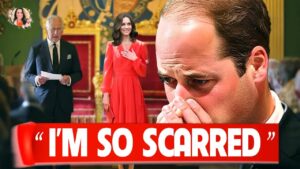A new report has unveiled a troubling rift between King Charles and Prince William, highlighting a personal and grave aspect of their relationship.
As both figures navigate the complexities of royal leadership, tensions are reportedly escalating over differing visions for the monarchy’s future.
This internal struggle raises critical questions about the direction in which the royal family is headed.
During a recent army engagement, Prince William made a seemingly offhand remark that sparked intrigue regarding his father’s health and reign.
Surrounded by neatly arranged military personnel and an attentive press corps, he engaged in light-hearted banter but hinted at deeper concerns.
“I’m going to make sure my father doesn’t squeeze in too many more moments,” he quipped, a statement that resonates with the gravity of the situation surrounding King Charles.
Insiders reveal that despite grappling with cancer, Charles remains resolute in his ambition to be a vibrant monarch.
His determination shines through even in the face of personal challenges.
Sources close to the King suggest that he is intensely focused on his role, refusing to let health issues obstruct his reign.
This unwavering commitment adds a layer of complexity to the father-son dynamic as they both strive to assert their visions for the crown.
Meanwhile, Prince William is preparing himself for the day he will ascend the throne.
He is serious about the responsibilities that await him and envisions a monarchy that aligns with contemporary values.
His approach signifies a desire to infuse the royal institution with youthful energy, indicating a potential shift in how the monarchy interacts with the public.
As the anniversary of King Charles’ cancer treatment approaches, uncertainty looms.
Questions about the specifics of his condition and prognosis remain largely unanswered, known only to his medical team.
Against this backdrop, William’s comment about “squeezing in too many moments” takes on a weighty significance, hinting at the fragility of the situation.
On a brighter note, there have been positive changes in King Charles’ lifestyle.
Tom Parker Bowles, the son of Queen Camilla, recently shared that the King has made adjustments to his diet, notably reducing his intake of red meat.
This shift reflects a broader awareness of health and wellness, especially given his recent health struggles.
“Food is part of the body’s medicine,” Bowles remarked, emphasizing the importance of nutrition in recovery.
Despite his health challenges, King Charles has not shied away from fulfilling his royal duties.
He paused his cancer treatment to embark on a tour of Australia and Samoa in October, showcasing his commitment to duty.
A senior palace official disclosed plans for a comprehensive overseas tour next year, signaling optimism for the King’s ability to engage with the public and fulfill his responsibilities.
The King’s approach to his health and duties illustrates a belief in the interconnectedness of mind, body, and spirit.
This perspective has proven effective during royal visits, as he embodies a strong sense of duty.
However, his diagnosis has undeniably shifted the landscape of his reign, casting doubt on how long he can continue in his role.
The discovery of King Charles’ illness arrives at a pivotal moment for the monarchy, which is already facing scrutiny.
A recent poll indicates a growing divide in public sentiment, with an increasing number of Britons expressing negative views toward the monarchy since the passing of Queen Elizabeth II.
Despite the coronation’s success, it has failed to significantly alter public perception.
At 76 years old, King Charles is navigating the delicate balance between tradition and modernity.
His scaled-back coronation and candid reflections on health challenges demonstrate his awareness of both personal and public expectations.
The evolving challenges facing the monarchy—from familial tensions to diminishing public support—underscore the intricate nature of royal life in today’s world.
Ultimately, King Charles’ journey encapsulates more than just the themes of tradition and duty.
It is a narrative steeped in resilience and adaptability, illustrating how the royal family must evolve amid adversity.
As tensions simmer and the future remains uncertain, the story of the monarchy continues to unfold, captivating the public’s attention.
